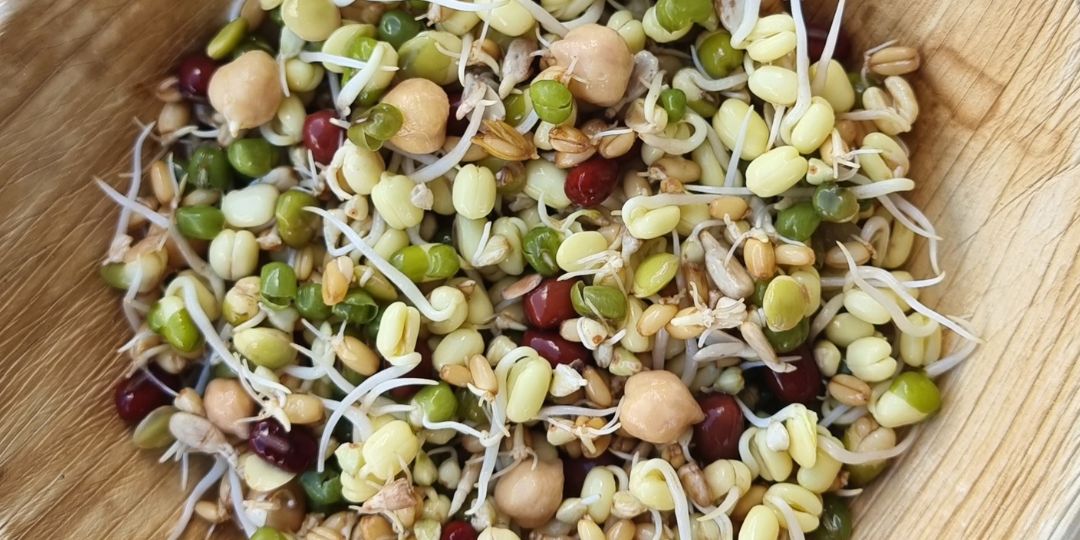As a bird owner, you likely understand the importance of a nutritious diet for your feathered companions. While you may already provide high-quality pellets, seeds, and fresh raw foods, adding sprouted seeds can greatly benefit their health.
The sprouting process releases digestible enzymes, allowing the body to absorb more proteins, vitamins, and minerals than dry seeds. Sprouting is an easy and cheap way of providing your bird with healthy food.
Sprouting is the longer version of Soaking, although the start of the process is the same it will require more attention.
Tools you will need;
It can be soaked in any clean container, but you will require a fine strainer as some seeds are very small. Our Beginner Sprouting Jar works best.
How to Start Sprouting;
Measure out the amount you want to sprout, making sure to use a clean measuring cup. The general rule is one tablespoon per bird, per day.
Thoroughly rinse the seeds in the Sprouting Jar under cold water to remove dust. Do this until it runs close to clear.
Soak for twenty-four hours, the water in the jar may change colour during this process, but this is not a problem.
After twenty-four hours you will see the seeds have adsorbed water and expanded. Some seeds may already be sprouting; this is fine. Rinse with cold water until it runs clear and allow to drain.
You will need to constantly rinse and drain the seeds throughout the whole process, this will remove any mould and keep the seeds hydrated. We recommend no less than four times a day. Keeping the jar on the kitchen sink is a good reminder to rinse the seeds whenever you are there, you can't over-rinse the seeds.
After a day the seeds should start to grow little "tails" at this stage you rinse, drain then start offering it to your birds. Sprouted seeds are most nutritious if fed while the tails are just emerging. Some grains or seeds may take a little longer than others; like Sunflower, it is still okay to feed if some are only just starting to grow tails. Under ideal conditions, should take no longer than two days to be ready for feeding.
Where should i keep the jar during the sprouting process;
The kitchen sink is a good place, ensure it is out of direct sunlight and can't be contaminated by kitchen chemicals.
Can i put sprouted seeds in the fridge;
To slow down the sprouting process and extend the life of the sprouting seeds you can put them in the fridge. They must be covered and will always need to be rinsed and drained before offering to your bird. Sprouts can last up to three days in the fridge.
How long do sprouted seeds last;
Sprouted seeds are most nutritious if fed while the tails are just emerging. We recommend using the sprouted seeds within three days. Sprouted seeds should have an earthy smell, seeds that smell sour or are going brown should not be fed.
How much should i feed;
It can be offered 2-3 times a week, taking into account your bird's daily needs. As a guide one dry tablespoon per two birds. Sprouting seed must be at least soaked and cannot be offered dry. Always offer a clean dish and remove uneaten food after three hours.
How do i offer sprouted seeds;
We recommend mixing it with your bird's favourite fresh food especially if they are new to sprouts. If you are mixing sprouts with your bird's chop it is important to only do this at the time you are offering it, don't mix into your bird's chop and feed later on. Sprouts can be offered by themselves but are best offered in a chop as it can help encourage your birds to try new foods. You can also freeze sprouts to use at a later time.
Can sprouts grow mould;
When feeding sprouted seed, ensure it is free from mould, and other kitchen contaminates. If you have particular issues, you can use a few drops of Vetfarm Aviclens or Organic Apple Cider Vinegar when soaking.
Storing the dry blend;
We recommend keeping it in the freezer, this won't affect the seeds and you can just take out what you want to sprout as you go.

